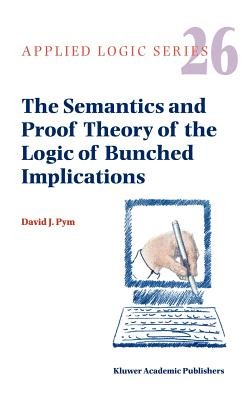
- We will send in 10–14 business days.
- Author: David J Pym
- Publisher: Springer
- ISBN-10: 1402007450
- ISBN-13: 9781402007453
- Format: 16.6 x 24.9 x 2.4 cm, hardcover
- Language: English
- SAVE -10% with code: EXTRA
The Semantics and Proof Theory of the Logic of Bunched Implications (e-book) (used book) | bookbook.eu
Reviews
Description
This is a monograph about logic. Specifically, it presents the mathe- matical theory of the logic of bunched implications, BI: I consider Bl's proof theory, model theory and computation theory. However, the mono- graph is also about informatics in a sense which I explain. Specifically, it is about mathematical models of resources and logics for reasoning about resources. I begin with an introduction which presents my (background) view of logic from the point of view of informatics, paying particular attention to three logical topics which have arisen from the development of logic within informatics: - Resources as a basis for semantics; - Proof-search as a basis for reasoning; and - The theory of representation of object-logics in a meta-logic. The ensuing development represents a logical theory which draws upon the mathematical, philosophical and computational aspects of logic. Part I presents the logical theory of propositional BI, together with a computational interpretation. Part II presents a corresponding devel- opment for predicate BI. In both parts, I develop proof-, model- and type-theoretic analyses. I also provide semantically-motivated compu- tational perspectives, so beginning a mathematical theory of resources. I have not included any analysis, beyond conjecture, of properties such as decidability, finite models, games or complexity. I prefer to leave these matters to other occasions, perhaps in broader contexts.
EXTRA 10 % discount with code: EXTRA
The promotion ends in 16d.15:28:07
The discount code is valid when purchasing from 10 €. Discounts do not stack.
- Author: David J Pym
- Publisher: Springer
- ISBN-10: 1402007450
- ISBN-13: 9781402007453
- Format: 16.6 x 24.9 x 2.4 cm, hardcover
- Language: English English
This is a monograph about logic. Specifically, it presents the mathe- matical theory of the logic of bunched implications, BI: I consider Bl's proof theory, model theory and computation theory. However, the mono- graph is also about informatics in a sense which I explain. Specifically, it is about mathematical models of resources and logics for reasoning about resources. I begin with an introduction which presents my (background) view of logic from the point of view of informatics, paying particular attention to three logical topics which have arisen from the development of logic within informatics: - Resources as a basis for semantics; - Proof-search as a basis for reasoning; and - The theory of representation of object-logics in a meta-logic. The ensuing development represents a logical theory which draws upon the mathematical, philosophical and computational aspects of logic. Part I presents the logical theory of propositional BI, together with a computational interpretation. Part II presents a corresponding devel- opment for predicate BI. In both parts, I develop proof-, model- and type-theoretic analyses. I also provide semantically-motivated compu- tational perspectives, so beginning a mathematical theory of resources. I have not included any analysis, beyond conjecture, of properties such as decidability, finite models, games or complexity. I prefer to leave these matters to other occasions, perhaps in broader contexts.


Reviews